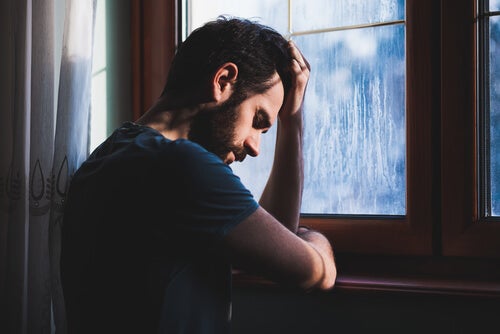Nine Signals That You're Feeling Guilty

One of the most complicated feelings to work and overcome is guilt.
Throughout your life, you’re surrounded by moral and cultural norms, which make it rather difficult for you when it comes to recognizing the causes of guilt and overcoming it. For the same reason, guilt affects many areas of your life.
Guilt is related to self-esteem and feelings of shame. Indeed, it’s really common to feel inferior to the people around you when you feel guilty. This often makes you unable to share your feelings with them and to solve what happens on your own.
The difficulty derives from not being aware of it. In addition, feeling guilty may be creating an obstacle in your personal growth process, gradually reducing your quality of life and, consequently, your happiness.

How to recognize that you’re feeling guilty
Although it can present itself in many ways, these are the nine most recognizable signals that you’re feeling guilty.
1. Being immune to flattery and constructive criticism. You run away when others show concern for you or simply try to share their affection for you in the form of praise and constructive criticism. That’s because guilt makes you feel undeserving of such sentiments. Thus, you avoid showing an appropriate attitude.
Guilt also leads you to cover your negative emotions up so that no one perceives what’s happening to you. This may make you appear cold and aloof.
2. Not enjoying what you like doing. When you feel unhappy due to guilt, you feel like you don’t want to do anything.
It’s important not to force yourself to do those things, thinking that it’ll make you feel better. That’s because it’s likely that you’ll be unable to see beyond what’s causing how you’re feeling right now.
3. Being too busy at work and home. Long working hours or taking refuge in hours of study can lead you, in a short time, to realize that you’re stuck in a self-pitying routine, but you make the excuse that you’re really busy.
4. You feel incapable of achieving what’s proposed. When you don’t solve your feelings of guilt, it can easily give rise to depression, affecting your personal life to a great extent.
All human beings have a list of things to do in order to feel fulfilled and to unconsciously grow. If you drag guilt around with you on a daily basis, you’ll feel like you’re achieving nothing, no matter how hard you try.
5. Telling white lies: In order not to damage your self-esteem, you tell little white lies that you think are harmless in order to not look bad.
Recognizing that you’re acting in this manner is a big step toward being honest with yourself and starting to work on the guilt you’re feeling.
6. Neglecting your social relationships. The fact of feeling guilty leads you to avoid the people in your close circle. For instance, friends, family, and the people who know you best. In fact, you do your utmost so they won’t discover your negative way of living.
Moving away from the people you love will be accentuated by the shame of feeling guilty.
7. Constant worry. Your worrying is an adaptation to the environment that surrounds you. It keeps you alert for possible dangers that threaten you.
Being worried doesn’t allow you to focus on what’s preventing you from being happy, since you’re using up all your energy on worrying and are unable to see beyond. It’s worth remembering that all adaptive systems have their downsides.
Worry makes your day-to-day unhappy, simply by keeping you continually focused on the thoughts that arise around the guilt you feel.
8. You sleep and eat little. For there to be an inner balance, your body needs to remain continuously connected to your mental state.
The sadness and apathy caused by guilt affect your natural biological rhythm, altering both your desire to eat and difficulty in falling asleep. This signal is one of the easiest to perceive and has its origins in all kinds of guilt.

9. Headaches. Migraines or headaches originate from continuous states of physical and emotional discomfort experienced over time.
When you don’t solve a problem or put it off, your body tells you, in a psychosomatic way, that you need to stop. Nevertheless, taking pills instead of sitting down and being aware of what’s happening to you, will only lead you to feel even guiltier.
You’ve probably experienced some of these signals at certain points in your life. Indeed, guilty feelings form a part of certain stages of your personal growth. Even so, it’s good to be aware of them in case one day they should happen to you more frequently. This will allow you to solve them quickly and prevent them from becoming more serious.
One of the most complicated feelings to work and overcome is guilt.
Throughout your life, you’re surrounded by moral and cultural norms, which make it rather difficult for you when it comes to recognizing the causes of guilt and overcoming it. For the same reason, guilt affects many areas of your life.
Guilt is related to self-esteem and feelings of shame. Indeed, it’s really common to feel inferior to the people around you when you feel guilty. This often makes you unable to share your feelings with them and to solve what happens on your own.
The difficulty derives from not being aware of it. In addition, feeling guilty may be creating an obstacle in your personal growth process, gradually reducing your quality of life and, consequently, your happiness.

How to recognize that you’re feeling guilty
Although it can present itself in many ways, these are the nine most recognizable signals that you’re feeling guilty.
1. Being immune to flattery and constructive criticism. You run away when others show concern for you or simply try to share their affection for you in the form of praise and constructive criticism. That’s because guilt makes you feel undeserving of such sentiments. Thus, you avoid showing an appropriate attitude.
Guilt also leads you to cover your negative emotions up so that no one perceives what’s happening to you. This may make you appear cold and aloof.
2. Not enjoying what you like doing. When you feel unhappy due to guilt, you feel like you don’t want to do anything.
It’s important not to force yourself to do those things, thinking that it’ll make you feel better. That’s because it’s likely that you’ll be unable to see beyond what’s causing how you’re feeling right now.
3. Being too busy at work and home. Long working hours or taking refuge in hours of study can lead you, in a short time, to realize that you’re stuck in a self-pitying routine, but you make the excuse that you’re really busy.
4. You feel incapable of achieving what’s proposed. When you don’t solve your feelings of guilt, it can easily give rise to depression, affecting your personal life to a great extent.
All human beings have a list of things to do in order to feel fulfilled and to unconsciously grow. If you drag guilt around with you on a daily basis, you’ll feel like you’re achieving nothing, no matter how hard you try.
5. Telling white lies: In order not to damage your self-esteem, you tell little white lies that you think are harmless in order to not look bad.
Recognizing that you’re acting in this manner is a big step toward being honest with yourself and starting to work on the guilt you’re feeling.
6. Neglecting your social relationships. The fact of feeling guilty leads you to avoid the people in your close circle. For instance, friends, family, and the people who know you best. In fact, you do your utmost so they won’t discover your negative way of living.
Moving away from the people you love will be accentuated by the shame of feeling guilty.
7. Constant worry. Your worrying is an adaptation to the environment that surrounds you. It keeps you alert for possible dangers that threaten you.
Being worried doesn’t allow you to focus on what’s preventing you from being happy, since you’re using up all your energy on worrying and are unable to see beyond. It’s worth remembering that all adaptive systems have their downsides.
Worry makes your day-to-day unhappy, simply by keeping you continually focused on the thoughts that arise around the guilt you feel.
8. You sleep and eat little. For there to be an inner balance, your body needs to remain continuously connected to your mental state.
The sadness and apathy caused by guilt affect your natural biological rhythm, altering both your desire to eat and difficulty in falling asleep. This signal is one of the easiest to perceive and has its origins in all kinds of guilt.

9. Headaches. Migraines or headaches originate from continuous states of physical and emotional discomfort experienced over time.
When you don’t solve a problem or put it off, your body tells you, in a psychosomatic way, that you need to stop. Nevertheless, taking pills instead of sitting down and being aware of what’s happening to you, will only lead you to feel even guiltier.
You’ve probably experienced some of these signals at certain points in your life. Indeed, guilty feelings form a part of certain stages of your personal growth. Even so, it’s good to be aware of them in case one day they should happen to you more frequently. This will allow you to solve them quickly and prevent them from becoming more serious.
This text is provided for informational purposes only and does not replace consultation with a professional. If in doubt, consult your specialist.







